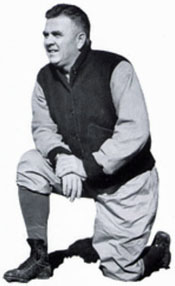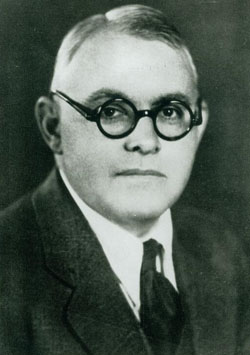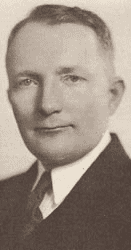LSU Pivotal Football Moments
pivotal college football moment: A decision by a coach or athletic director that changes the momentum of a program or an action by a player that changes the momentum of a game.
pivotal college football moment: A decision by a coach or athletic director that changes the momentum of a program or an action by a player that changes the momentum of a game.
Bernie Moore, born in Jonesborough TN and a graduate of Carson-Newman College in that state, came to LSU in 1929 as line coach on Russ Cohen's football staff.
The next year Moore became coach of LSU's track and field team. After only two years, his squad won the Southern Conference Championship. In 1933, he took five members of his team to the NCAA championships in Chicago, where they outpointed Southern California 58-54 for the title.
Meanwhile, Moore impressed Coach Cohen with the way he handled the freshman team and his prowess at scouting future opponents. When Biff Jones replaced Cohen in 1932, he retained Moore on his staff as his top scout.




L-R: Bernie Moore, Russ Cohen, Huey Long and Biff Jones, T. P. Heard
When Jones abruptly resigned at the end of the 1934 season, Senator Huey Long promised a "big-time coach" to replace Jones. But T. P. Heard, LSU's athletic director, recommended Moore. "I felt Bernie knew the material and knew the situation at LSU as well as anyone," said Heard. The "situation at LSU" involved, first and foremost, getting along with Huey.
Baton Rouge Advocate sportswriter W. I. Spencer agreed with Heard. He wrote the day after Jones's "official" resignation was accepted: "I nominate Bernie Moore as the next football coach of Louisiana State University. We all know this job will be most difficult in the future. Bernie Moore, a diplomat if there ever was one, an easy man to get along with, a shrewd thinker who can get the most out of men, a thorough student of football, a fine leader and cooordinator as his record shows, a great mixer and a gentleman if there ever was one, is in my mind now the one man who can take job at L. S. U. and turn it out successfully, considering his knowledge of the situation, familiarity with the athletes, and his holding of the confidence of supporters of L. S. U., of officials of the university, of newspapermen, and if I am not mistaken, also the confidence of Huey Long."
But Long continued his quest, contacting Clark Shaughnessy of Tulane, who wasn't interested, and Frank Thomas of Alabama, who was on his way to California with his team for the Rose Bowl. Thomas agreed to come to LSU for a $15,000 annual salary plus salaries of $7,500 for two assistants of his choosing. But Frank told Huey, "If any hint of this talk gets into the papers, the deal is off."
Long sent Heard to the West Coast with Alabama to send back reports that Thomas was still in the fold. But by his second call with Huey, Heard said, "I realized the situation was changing in Baton Rouge. 'Bernie Moore looks better to me all the time,' he told me. When I got to Los Angeles, the story was in the paper, 'Kingfish Appoints Moore Head Coach.' What happened was Huey called (Vanderbilt coach) Dan McGugin, a fellow he really respected, for his recommendation. Dan recommended Bernie, and that was good enough for the Senator."
Moore knew that his biggest challenge was getting along with Huey. "I lost some friends when Huey appointed me. They figured I was Huey's pet, but I wasn't his enemy either. I understood him. I also learned never to discuss anything with him unless I knew more about it than he did."
Moore became head coach the same year the Southeastern Conference became the first conference to offer athletic scholarships.
Bernie won nine games in each of his first three seasons as head coach. LSU won the Southeastern Conference in both 1935 and '36 and finished second in '37. The Tigers played in the Sugar Bowl all three seasons but lost every game.
Moore continued as head coach through the 1947 season, after which he resigned to become SEC Commissioner. His teams never won the SEC again but did go to two bowl games. His only bowl win came in the 1944 Orange Bowl. His strongest team, the 1946 squad, played in the 1957 Cotton Bowl and endured a frustrating scoreless tie in icy conditions.
Moore's record at LSU was 83-39-6 in all games and 43-28-4 in conference games.